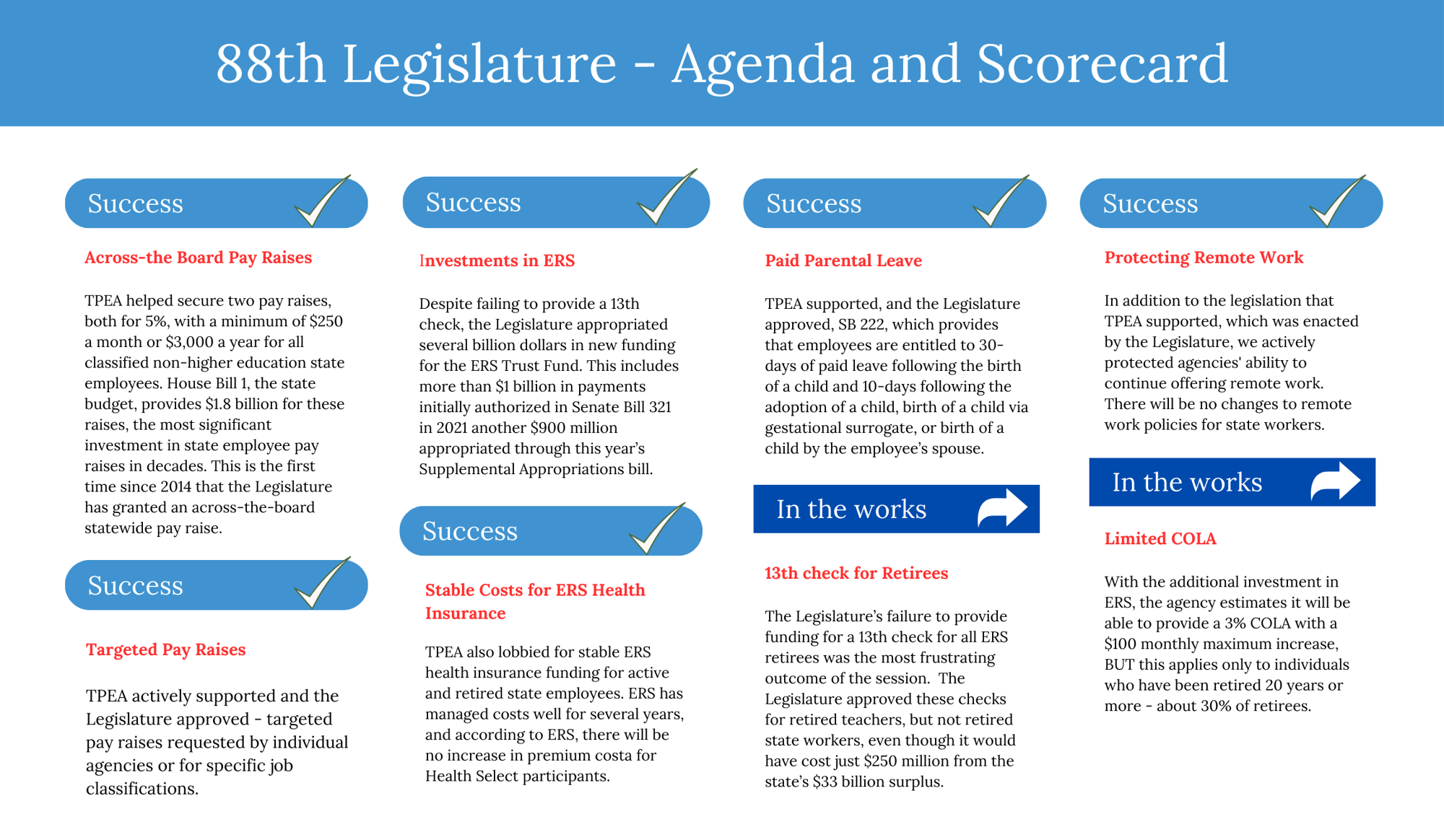
Standing with our Retired State Employees and Securing Pay Raises Across-the-board for State Employees
For over 75 years, the Texas Public Employees Association (TPEA) has been dedicated to safeguarding the financial well-being of both current and retired state employees.
TPEA secured salary increases for 140,000+ state employees representing every region of Texas. These individuals play a crucial role in supporting vulnerable children, the elderly, and overseeing various industries, as well as maintaining essential public infrastructure for the state's growth and prosperity.
TPEA also stands with the more than 120,000 retirees and their beneficiaries who receive their pensions through the Employees Retirement System (ERS). We are grateful to our retired Texans who protected public safety, served endangered children and the elderly, built the public infrastructure that allowed our state to grow and prosper, and so much more. Look across our vast Texas region and you will find retired state workers. TPEA will always advocate for our dedicated retirees and help protect the pensions and benefits available.

More Success!
In the 88th Legislature, TPEA secured increased state funding for pay raises, helping to stabilize and strengthen the recruitment and retention of a skilled workforce. TPEA achieved:
- Inflation-adjusted pay raises for all state employees in both years of the 2024-25 biennium.
- State agencies’ legislative appropriation requests for targeted and inflation-adjusted pay raises, including retention payments.
- Texas State Auditor’s recommendation in the Biennial Report on the State’s Position Classification Plan for the 2024-2025 biennium.
- An additional one-time legacy payment to the retirement fund accelerates actuarial soundness and allows the ERS trust fund to provide ERS retirees a COLA or Cost-of-Living Increase.
- State employee and retiree health insurance - support continuing the benefits and premium structure of the existing ERS health plan.
- Employees’ Retirement Program.
- ERS Retirement Plan Legacy Payment.
- Law Enforcement and Custodial Officers Supplemental Fund (Normal Cost and Debt Reduction).
- Retiree death benefit.
- ERS retirement plan legacy payment method of finance exchange.
- Financial assistance to survivors of law enforcement officers and firefighters.
The Challenges We Face and Continue to Work For
Retired and Current Employees
The Texas Legislature has not invested in a general state employee pay raise since 2014. Inadequate state compensation has caused a growing crisis in employee turnover that threatens the continued delivery of state services.
Concerning trend of state employees leaving their positions and the state workforce in significant numbers. This trend is exacerbated by historic inflation and higher salaries in the private sector, which have led many to seek opportunities outside of state employment. As a result, state agency operations and public services are at risk as positions remain unfilled for extended periods in this competitive job market.
Without qualified workers in state agencies, the maintenance of our roads and parks, processing of unemployment claims, investigation of complaints, and smooth operation of state services are all at risk.
The purchasing power of pensions earned by retired state employees has declined significantly over the past two decades. Workers who retired since the last annuity adjustment in 2001 have seen the value of their pension checks reduced by as much as 40%.
Given the drastic effects of inflation coupled with the sheer length of time since any annuity adjustment, TPEA believes an annuity adjustment for ERS retirees is long overdue, and the last benefit increase was in 2001.
In the 88th Legislative Session
TPEA diligently advocated for members by educating legislators and the public on the importance of supporting state retirees, engaging in Capitol activities, and collaborating with other organizations to seek legislative support. We created a multitude of documents, letters, ads, posts and in-person meet and greets. It continues to be our goal in the 89th Legislative Session.



